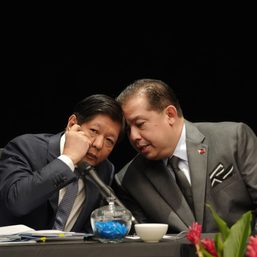SUMMARY
This is AI generated summarization, which may have errors. For context, always refer to the full article.

Speaker Alan Peter Cayetano, who belongs to a political dynasty, said term limits are the reason why relatives within the second degree of consanguinity tend to run in the same elections in the Philippines.
The top House leader made the statement on Monday, July 20, as he explained why he believes amending the 1987 Constitution is “needed” in the wake of the latest charter change proposals of the League of Municipalities of the Philippines (LMP).
Speaking to reporters in his bailiwick Taguig City, Cayetano slammed critics of charter change.
“So sabi nila, ayaw na nila ng dynasty. Ang nag-create po ng dynasty is ‘yong term limits, ‘di ba?” Cayetano said.
(So they’re saying they don’t want dynasties. What created dynasties are term limits, right?)
He said mayors find it difficult to perform their duties since they only have 3-year terms.
“Sasabihin nila, ‘yong mga mayor natin panay pulitika. Eh 3 years ‘yung term eh… Habang hindi natin ginagawa na katulad ng worldwide, mga 4 to 5 years ang term eh, para nakakapag-planning, nakakapag-trabaho,” the Speaker said.
(They’ll say the mayors are all about politics. But the term is just 3 years… We’re not doing what’s being done worldwide, where the term is 4 to 5 years and you can do proper planning and do your job.)
The Speaker himself is a product of a political dynasty. Cayetano represents the 1st District of Taguig City-Pateros, while his wife Lani Cayetano represents the 2nd District.
His younger brother Lino Cayetano is Taguig City mayor, while their sister Pia Cayetano is currently a senator.
The Speaker claimed his clan did not intend to become a political dynasty, yet “bitter political rivalries” influenced their decision to all run in the last two elections.
“Katulad po dito sa Taguig. Hindi ninais ng mga Cayetano na 3 sa mataas na posisyon ay Cayetano. And problema, noong mayro’ng bitter political rivalry, dumating ako sa punto na binu-bulldozer ng isang mayor namin na hindi ko kasama ‘yong mga project na ginagawa ko at ginagawa ng DPWH (Department of Public Works and Highways),” said Cayetano.
(Like here in Taguig. The Cayetanos did not mean to get 3 high positions. The problem is that when there was a bitter political rivalry, I reached a point where a mayor I’m not allied with would ram over my projects and the projects of the DPWH.)
Back in July 2019 – just before he was elected as Speaker – Cayetano said lawmakers who either serve for 4 years with no term limits, or 5 years with term limits will become “more productive” public servants. (READ: ‘It’s a practical thing’: Cayetano wants longer term for lawmakers)
‘Pay the price’ for reforms
The Speaker then said “you have to pay the price” if the public wants reforms in the political system.
“So that’s the reality there. You want reform, you have to pay the price for reform. Ang problema sa mga anti-Cha-Cha na iba, they want reform, pero ‘yon lang nasa utak nila na reform. Pero ‘yong actual na reform, sa batas, sa Constitution, ayaw nila,” said Cayetano.
(So that’s the reality there. You want reform, you have to pay the price for reform. The problem with some anti-Cha-Cha advocates is that they want reform, but that that’s the only thing in their minds. But when it comes to actual reforms in law, in the Constitution, they don’t want that.)
At least 163 political families currently have members who won as senators, House representatives, and governors during the 2019 elections. (READ: MAP: Major political families in PH after the 2019 elections)
President Rodrigo Duterte himself is part of a political dynasty, as 3 of his children won seats in Davao City during the 2019 elections: Mayor Sara Duterte, Vice Mayor Sebastian Duterte, and Davao City 1st District Representative Paolo Duterte.
Article II, Section 26 of the Constitution prohibits political dynasties, but there is supposedly no law to implement this provision. However, Rappler columnist Emil Marañon III, an election lawyer, argues that Republic Act No. 10742 or the Sangguniang Kabataan Reform Act already defines what a political dynasty is, and can be the basis for implementing the constitutional ban. (READ ALSO: [OPINION] Practical questions on the Sangguniang Kabataan law’s anti-dynasty provision)
There have been repeated attempts in Congress to finally pass the anti-political dynasty bill over the years, but the measure has so far failed to hurdle the Senate and the House, where scions of political clans are repeatedly elected into office. – Rappler.com
Add a comment
How does this make you feel?



![[Vantage Point] Philippine economic reforms run into headwinds](https://www.rappler.com/tachyon/2024/05/ph-economic-headwind-may-2024.jpg?resize=257%2C257&crop_strategy=attention)
![[In This Economy] A counter-rejoinder in the economic charter change debate](https://www.rappler.com/tachyon/2024/04/TL-counter-rejoinder-apr-20-2024.jpg?resize=257%2C257&crop=267px%2C0px%2C720px%2C720px)





There are no comments yet. Add your comment to start the conversation.